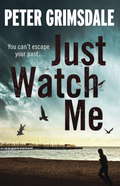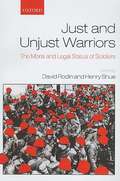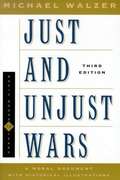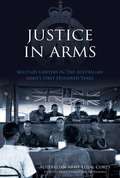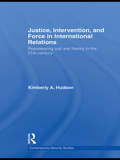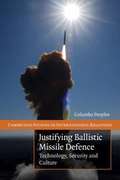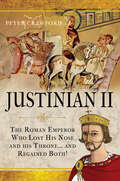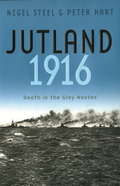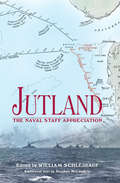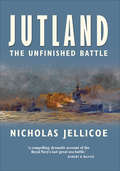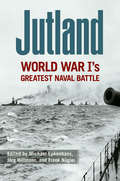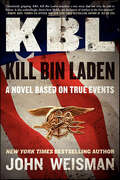- Table View
- List View
Just Watch Me
by Peter GrimsdaleYou can't escape your past... When an ex-sniper loses his family, he finds himself in the cross-hairs of a massive conspiracy. A gripping thriller from the author of PERFECT NIGHT.When Dan Carter is forced to miss a much-needed family holiday, his wife and children go ahead without him. Within hours, their plane has disappeared over the Atlantic and his life is changed for ever.Stricken by grief, Dan goes in search of answers. Was this simply a terrible tragedy or something more sinister - something personal? For the Carters are not a normal family. Perhaps they never were...Shadows from the past gather around him as Dan edges closer to the truth, and a chilling conspiracy threatens to engulf him. But in a world where nothing is as it seems, who can he really trust...?
Just a Little Bit Pregnant (Just a Little Bit #1)
by Eileen Wilks"I'M WHAT?!"The doctor had confirmed it-Jacy James was two months pregnant. Her torrid, twelve-hour affair with Tom Rasmussin had apparently left her more than just satisfied. Trouble was, the father-to-be had run off while the tousled sheets were still hot. Now Jacy had to tell him the news....Detective Tom Rasmussin hadn't been able to get Jacy or that searing night of passion out of his mind. So when he learned he was going to be a daddy, well, marriage seemed the right thing to do. But the proud woman turned him down flat. And now this determined bachelor had to convince Jacy that one night of passion could mean a lifetime of happiness....
Just and Unjust Warriors: The Moral and Legal Status of Soldiers
by Henry Shue David RodinCan a soldier be held responsible for fighting in a war that is illegal or unjust? This is the question at the heart of a new debate that has the potential to profoundly change our understanding of the moral and legal status of warriors, wars, and indeed of moral agency itself. The debate pits a widely shared and legally entrenched principle of war-that combatants have equal rights and equal responsibilities irrespective of whether they are fi ghting in a war that is just or unjust-against a set of striking new arguments. These arguments challenge the idea that there is a separation between the rules governing the justice of going to war (the jus ad bellum) and the rules governing what combatants can do in war (the jus in bello). If ad bellum and in bello rules are connected in the way these new arguments suggest, then many aspects of just war theory and laws of war would have to be rethought and perhaps reformed. <P><P>This book contains eleven original and closely argued essays by leading figures in the ethics and laws of war and provides an authoritative treatment of this important new debate. The essays both challenge and defend many deeply held convictions: about the liability of soldiers for crimes of aggression, about the nature and justifiability of terrorism, about the relationship between law and morality, the relationship between soldiers and states, and the relationship between the ethics of war and the ethics of ordinary life. <P><P>This book is a project of the Oxford Leverhulme Programme on the Changing Character of War.
Just and Unjust Wars: A Moral Argument With Historical Illustrations, 3rd Ed.
by Michael WalzerThis classic work examines the issues surrounding military theory, war crimes, and the spoils of war from the Athenian attack on Melos to the My Lai massacre. A revised and updated classic treatment of the morality of war written by one of our country's leading philosophers. Just and Unjust Wars examines a variety of conflicts in order to understand exactly why, according to Walzer, "the argument about war and justice is still a political and moral necessity." Walzer's classic work draws on historical illustrations that range all the way from the Athenian attack on Melos to this morning's headlines, and uses the testimony of participants-decision makers and victims alike-to examine the moral issues of warfare.
Just and Unjust Wars: A Moral Argument with Historical Illustrations
by Michael WalzerFrom the Athenian attack on Melos to the My Lai Massacre, from the wars in the Balkans through the first war in Iraq, Michael Walzer examines the moral issues surrounding military theory, war crimes, and the spoils of war. He studies a variety of conflicts over the course of history, as well as the testimony of those who have been most directly involved--participants, decision makers, and victims. In his introduction to this new edition, Walzer specifically addresses the moral issues surrounding the war in and occupation of Iraq, reminding us once again that "the argument about war and justice is still a political and moral necessity."
Just and Unjust Wars: A Moral Argument with Historical Illustrations, 4th Ed.
by Michael WalzerFrom the Athenian attack on Melos to the My Lai Massacre, from the wars in the Balkans through the first war in Iraq, Michael Walzer examines the moral issues surrounding military theory, war crimes, and the spoils of war. He studies a variety of conflicts over the course of history, as well as the testimony of those who have been most directly involved--participants, decision makers, and victims. In his introduction to this new edition, Walzer specifically addresses the moral issues surrounding the war in and occupation of Iraq, reminding us once again that "the argument about war and justice is still a political and moral necessity. "
Justice Ascending: A unputdownable read of dangerous race for survivial against a deadly bacteria... (The Scorpius Syndrome)
by Rebecca Zanetti'This dark, post-apocalyptic tale is a testament to the power of hope and love against all odds' Romantic TimesIt's a dangerous race for survival in the aftermath of a deadly bacteria spreading across the globe. Can love still shine in the darkness?Before Scorpius, Tace Justice was a good ole Texas cowboy who served his country. After surviving the bacterium, the world became dark, dangerous, and deadly - and so did he. The Vanguard medic is stronger, faster and smarter than before, but he's losing the line between right and wrong. His passion is absolute, and when he focuses it on one woman, there's no turning back for either of them . . .Sami Steel has been fighting to survive alongside Tace, convincing the Vanguard soldiers she's one of them. In truth, Sami is a former hacker turned government agent who worked at The Bunker, where scientists stored both contaminants and cures - and she never wants to go back. Yet when sexual fire explodes between her and Tace, she'll face even that hell again to save him.'Thrilling post-apocalyptic romance at its dark, sizzling best!' Lara AdrianFor more thrilling passion played out against the dangerous race for survival, look for all the titles in The Scorpius Syndrome series:Mercury StrikingShadow FallingJustice AscendingStorm GatheringWinter IgnitingKnight Awakening
Justice In Arms: Military Lawyers In The Australian Army's first Hundred Years
by Australian Army Legal CorpsJustice in Arms brings to life a fascinating and important element of Australia&’s legal history — the role of Army legal officers in Australia and in expeditionary operations from the Boer War until 2000. This is a comprehensive and absorbing history which describes the dynamic interaction of institutional and political imperatives and the personalities who managed this interaction over the decades. It is populated by colourful characters and legal luminaries and demonstrates that military justice is rightly concerned with discipline and cohesiveness. Reflecting broader societal norms, it is also concerned with the rule of law and respect for the rights, liberties and fair treatment of those who serve in the armed forces. Justice in Arms describes the extraordinary contribution of Army legal officers to both the profession of arms and the development of the law, charting the evolving personal and structural relationships between Army legal officers and command dictated by the changing legal needs of the Army and the broader Australian Defence Force. Today Army legal officers apply, adapt and shape the law to meet evolving needs in peacetime and during armed conflict and peace operations, ensuring the legitimacy of military action and the maintenance of domestic and international support for national objectives.
Justice and the Enemy: Nuremberg, 9/11, and the Trial of Khalid Sheikh Mohammed
by William ShawcrossSince the Nuremberg Trials of 1945, lawful nations have struggled to impose justice around the world, especially when confronted by tyrannical and genocidal regimes. But in Cambodia, the USSR, China, Bosnia, Rwanda, and beyond, justice has been served haltingly if at all in the face of colossal inhumanity. International Courts are not recognized worldwide. There is not a global consensus on how to punish transgressors. The war against Al Qaeda is a war like no other. Osama bin Laden, Al Qaeda's founder, was killed in Pakistan by Navy Seals. Few people in America felt anything other than that justice had been served. But what about the man who conceived and executed the 9/11 attacks on the US, Khalid Sheikh Mohammed? What kind of justice does he deserve? The U. S. has tried to find the high ground by offering KSM a trial - albeit in the form of military tribunal. But is this hypocritical? Indecisive? Half-hearted? Or merely the best application of justice possible for a man who is implacably opposed to the civilization that the justice system supports and is derived from? In this book, William Shawcross explores the visceral debate that these questions have provoked over the proper application of democratic values in a time of war, and the enduring dilemma posed to all victors in war: how to treat the worst of your enemies.
Justice in Asia and the Pacific Region, 1945-1952
by Yuma TotaniThis book explores a cross section of war crimes trials that the Allied powers held against the Japanese in the aftermath of World War II. More than 2,240 trials against some 5,700 suspected war criminals were carried out at 51 separate locations across the Asia Pacific region. This book analyzes fourteen high-profile American, Australian, British, and Philippine trials, including the two subsequent proceedings at Tokyo and the Yamashita trial. By delving into a large body of hitherto underutilized oral and documentary history of the war as contained in the trial records, Yuma Totani illuminates diverse firsthand accounts of the war that were offered by former Japanese and Allied combatants, prisoners of war, and the civilian population. Furthermore, the author makes a systematic inquiry into select trials to shed light on a highly complex - and at times contradictory - legal and jurisprudential legacy of Allied war crimes prosecutions.
Justice, Intervention, and Force in International Relations: Reassessing Just War Theory in the 21st Century (Contemporary Security Studies)
by Kimberly A. HudsonThis book analyses the problems of current just war theory, and offers a more stable justificatory framework for non-intervention in international relations. The primary purpose of just war theory is to provide a language and a framework by which decision makers and citizens can organize and articulate arguments about the justice of particular wars. Given that the majority of conflicts that threaten human security are now intra-state conflicts, just war theory is often called on to make judgments about wars of intervention. This book aims to critically examine the tenets of just war theory in light of these changes, and formulate a new theory of intervention and just cause. For Michael Walzer, the leading scholar of just war theory, armed humanitarian intervention is permissible only in cases of genocide, ethnic cleansing, widespread massacres, or enslavement. This book shows why this threshold is too restrictive in light of the progressive shift away from interstate conflict as well as the emerging norms of 'sovereignty as responsibility' and the 'responsibility to protect'. Justice, Intervention and Force in International Relations aims to establish a new, stable foundation for non-intervention and a revised threshold for 'just cause'. In addition, this book demonstrates that over-reliance on the just cause category distorts understanding, analysis, and public discussion of the justice or injustice of resorting to war. This new book will be of much interest to students of ethics, security studies, international relations and international law. Kimberley Hudson is Assistant Professor of Political Science at American International College, and has a Phd in International Relations from Brown University.
Justifying America's Wars: The Conduct and Practice of US Military Intervention (Contemporary Security Studies)
by Nicholas Kerton-JohnsonThis book examines the justifications for, and practice of, war by the US since 1990, and examines four case studies: the Gulf War, Kosovo, Afghanistan and Iraq. The author undertakes an examination of presidential speeches and public documents from this period to determine the focal points on which the respective presidents based their rhetoric for war. The work then examines the practice of war in the light of these justifications to determine whether changes in justifications correlate with changes in practice. In particular, the justificatory discourse finds four key themes that emerge in the presidential discourses, which are tracked across the case studies and point to the fundamental driving force in US motivations for going to war. The four key themes which emerge from the data are: international law or norms; human rights; national interest; and egoist morality (similar too, but wider than, 'exceptionalism'). This analysis shows that 9/11 resulted in a radical shift away from an international law and human rights-focused justificatory discourse, to one which was overwhelmingly dominated by egoist-morality justifications and national interest. This book will be of much interest to students of US foreign policy, humanitarian intervention, Security Studies, and IR theory.
Justifying Ballistic Missile Defence
by Columba PeoplesTechnology is championed as the solution to modern security problems, but also blamed as their cause. This book assesses the way in which these two views collide in the debate over ballistic missile defense: a complex, costly and controversial system intended to defend the United States from nuclear missile attacks. Columba Peoples shows how, in the face of strong scientific and strategic critique, advocates of missile defense seek to justify its development by reference to broader culturally embedded perceptions of the promises and perils of technological development. Unpacking the assumptions behind the justification of missile defense initiatives, both past and present, this book illustrates how common-sense understandings of technology are combined and used to legitimate this controversial and costly defense program. In doing so it engages fundamental debates over understandings of technological development, human agency and the relationship between technology and security.
Justifying Interventions in Africa: (De)Stabilizing Sovereignty in Liberia, Burundi and the Congo
by Nina WilénThis new paperback edition of Justifying Interventions in Africa includes a new preface written by Professor Annika Björkdahl from Lund University. Analysing the UN interventions in Liberia, Burundi and the Congo, Wilén poses the question of how one can stabilize a state through external intervention without destabilizing sovereignty. She critically examines the justifications for international and regional interventions through a social constructivist framework.
Justifying War
by David Welch Jo FoxA new assessment of the debates about Just War in the twentieth and twenty-first centuries, from the imperial wars of the nineteenth century through the age of total war, the evolution of human rights discourse and international law, to proportionality during the Cold War and the redefinition of authority with the ascendancy of terror groups.
Justinian II: The Roman Emperor Who Lost his Nose and his Throne and Regained Both
by Peter CrawfordJustinian II became Roman emperor at a time when the Empire was beset by external enemies. His forces gained success against the Arabs and Bulgars but his religious and social policies fuelled internal opposition which resulted in him being deposed and mutilated (his nose was cut off) in 695. After a decade in exile, during which he strangled two would-be assassins with his bare hands, he regained power through a coup d’etat with the backing of the erstwhile Bulgar enemy (an alliance sealed by the marriage of his daughter, Anastasia). His second reign was seemingly harsher and again beset by both external and internal threats and dissension over doctrinal matters. An energetic and active ruler, his reign saw developments in various areas, including numismatics, administration, finance and architecture, but he was deposed a second time in 711 and beheaded. Drawing on all the available evidence and the most recent research, Peter Crawford makes a long-overdue re-assessment of Justinian’s colorful but troubled career and asks if he fully deserves his poor reputation.
Jutland, 1916: Death In The Grey Wastes (Sven Hassel War Classics)
by Peter Hart Nigel SteelDramatic, illustrated account of the biggest naval battle of the First World War.On 31 May, 1916, the great battle fleets of Britain and Germany met off Jutland in the North Sea. It was a climactic encounter, the culmination of a fantastically expensive naval race between the two countries, and expectations on both sides were high. For the Royal Navy's Grand Fleet, there was the chance to win another Trafalgar. For the German High Seas Fleet, there was the opportunity to break the British blockade and so change the course of the war. But Jutland was a confused and controversial encounter. Tactically, it was a draw; strategically, it was a British victory.Naval historians have pored over the minutiae of Jutland ever since. Yet they have largely ignored what the battle was actually like for its thousands of participants. Full of drama and pathos, of chaos and courage, JUTLAND, 1916 describes the sea battle in the dreadnought era from the point of view of those who were there.
Jutland, 1916: Death in the Grey Wastes
by Peter Hart Nigel SteelDramatic, illustrated account of the biggest naval battle of the First World War.On 31 May, 1916, the great battle fleets of Britain and Germany met off Jutland in the North Sea. It was a climactic encounter, the culmination of a fantastically expensive naval race between the two countries, and expectations on both sides were high. For the Royal Navy's Grand Fleet, there was the chance to win another Trafalgar. For the German High Seas Fleet, there was the opportunity to break the British blockade and so change the course of the war. But Jutland was a confused and controversial encounter. Tactically, it was a draw; strategically, it was a British victory.Naval historians have pored over the minutiae of Jutland ever since. Yet they have largely ignored what the battle was actually like for its thousands of participants. Full of drama and pathos, of chaos and courage, JUTLAND, 1916 describes the sea battle in the dreadnought era from the point of view of those who were there.
Jutland: The Naval Staff Appreciation
by William SchleihaufThe legendary hidden report on the Royal Navy&’s failures at the WWI Battle of Jutland is revealed for the first time in this transcribed edition. Jutland, the largest naval battle of the First World War, was the most controversial engagement in the Royal Navy&’s history. Falling well short of the total victory expected by the public, it sparked fierce debate among senior naval officers, many of whom had been directly involved in the battle. The first attempt to produce an objective record was delayed and heavily censored. That report was followed by a no-holds-barred critique of the fleet&’s performance intended for training purposes at the Naval Staff College. This became the now-infamous Naval Staff Appreciation, which was deemed too damaging to be published. All proof copies were ordered destroyed. Despite the orders, however, a few copies survived. Now this long-suppressed work is finally revealed in this edition featuring expert modern commentary and explanatory notes.
Jutland: The Unfinished Battle
by Nicholas JellicoeThis book not only re-tells the story of the battle from both a British and German perspective based on the latest research, but it also helps clarify the context of Germanys inevitable naval clash. It then traces the bitter dispute that ensued in the years after the smoke of war had cleared right up to his death in 1935, Admiral Jellicoe was embroiled in what became known as the Jutland Controversy.
Jutland: World War I's Greatest Naval Battle (Foreign Military Studies)
by Michael Epkenhans Frank Nägler Jörg Hillmann&“The essential reappraisal of this seminal event in twentieth-century naval history . . . a &‘must have&’ book for the Great War enthusiasts.&” —Lone Star Review After months of skirmishes between Britain&’s Royal Navy Grand Fleet and the German Navy&’s outnumbered High Seas Fleet, conflict erupted on May 31, 1916, in the North Sea near Jutland, Denmark, in what would become the most formidable battle in the history of the Royal Navy. In Jutland, international scholars reassess the strategies and tactics employed by the combatants as well as the political and military consequences of their actions. Most previous English-language military analysis has focused on British admiral Sir John Jellicoe, who was widely criticized for excessive caution and for allowing German vice admiral Reinhard Scheer to escape; but the contributors to this volume engage the German perspective, evaluating Scheer&’s decisions and his skill in preserving his fleet and escaping Britain&’s superior force. Together, the contributors lucidly demonstrate how both sides suffered from leadership that failed to move beyond outdated strategies of limited war between navies and to embrace the total war approach that came to dominate the twentieth century. The role of memory—comparing the way the battle has been portrayed in England and Germany—is also examined. Jutland is &“suited not only for scholars, but also for a wider audience interested in knowing more about both the war at sea in World War I and its greatest contest&” (Eric Osborne, author of The Battle of Heligoland Bight). &“The documentation and scholarship reflected in these articles is outstanding.&”—Paul Halpern, author of A Naval History of World War I
Jóvenes pistoleros: Violencia política en la transición
by Juan Cristóbal PeñaEn su nuevo libro, el destacado cronista chileno indaga en la vida y obra de Ricardo Palma Salamanca y sus cercanos A partir de su propia trayectoria vital, Juan Cristobal Peña rememora la vida de Ricardo Palma Salamanca y de Miska Brzovic, su pareja, a quien el autor de este libro conoció durante la educación secundaria. Entrecruzando sus recuerdos con los hechos y acontecimientos que dieron fama a ambos jóvenes, Peña reconstruye un periodo turbulento de nuestra historia reciente, que parte con las marchas y protestas estudiantiles a mediados de los ochenta y que se extiende hasta hoy, con Palma Salamanca viviendo en París luego de salir a la luz su cinematográfica y clandestina vida fuera de Chile.
K Boat Catastrophe: Eight Ships & Five Collisions
by N. S. NashOn 31 January 1918 nine K Class steam-powered submarines sailed with the Grand Fleet to Exercise in the North Sea. The ships left the Firth of Forth at a speed of 21 knots on a cold winter night with the flagship HMS Courageous leading the way. Following in her wake was HMS Ithuriel and the K Class submarines of the 13th Submarine Flotilla and then 5 nautical miles astern of them, four more capital warships.As they approached The Isle of May navigational confusion broke out, caused by the misinterpretation of ship's steaming lights and mayhem followed. During the next couple of hours five collisions occurred involving eight ships and resulting in the death of 105 officers and ratings. This fiasco and the resulting naval investigation and court marshal were shielded from the general public and kept in secret files until the full details were released in 1994. From this official report, the author now tells the full story of that dreadful night and the proceedings that followed. Background information on the evolution of the ill-fated and much hated K Class submarines is also included together with the investigation and court marshal proceedings of the events surrounding that tragic night.
K-9 Korea: The Untold Story of America's War Dogs in the Korean War
by J. Rachel ReedThe men of the 8125th Sentry Dog Detachment had no idea what they would find when their ship docked at Incheon, Korea. The dogs in the unit seemed even more uncertain than the men: they could smell the terror in the place. Almost immediately, these soldiers came to rely on each other—man and dog alike—for safety, courage, and companionship.Yet in the end, the men of the 8125th could have never imagined the terrible and final sacrifice their canine companions would be forced to make. K-9 Korea is the heartrending story of American war dogs—the fearless, loyal, forgotten heroes of the Korean War.
KBL: A Novel Based on True Events
by John Weisman“Weisman is perhaps wired more tightly into the reclusive special operations community than any other writer, and his knowledge of weaponry and field techniques is staggering.”—Washington Times“A pro who knows his stuff.”—Oliver NorthJohn Weisman, whose expertise in the field of covert military operations is unsurpassed, delivers a stunning fictional account of the most extraordinary mission of the century: the hunting down and assassination of Osama Bin Laden, the most reviled killer of the twenty-first century, by US Navy SEALs. With KBL: Kill Bin Laden the critically acclaimed author of SOAR and Jack in the Box goes behind the headlines, carrying readers along on a breakneck, breathtakingly realistic chase—from planning to training to execution—as the evil mastermind behind the horror of 9/11 is finally brought to justice.
